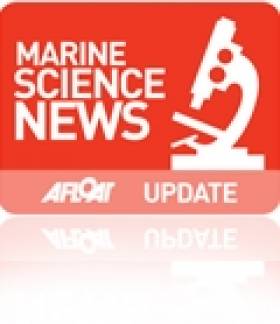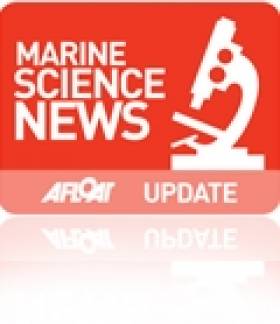Displaying items by tag: Whittard Canyon
#MarineScience - Marine scientists from Ireland, the UK, US and Germany are starting to examine data collected from the Marine Institute's recent research mission to the Whittard Canyon in the North Atlantic, according to RTÉ News.
As previously reported on Afloat.ie, researchers spent two weeks earlier this month exploring the sea bed of the deep ocean canyon some 250 miles southwest of Cork, using the institute's ROV Holland I to study the diversity of marine wildlife at depths of as much as 3km below the surface.
Among their finds so far is a rare black coral, while samples of deep sea sponge were also taken for analysis of climactic changes to the subsea ecosystem. RTÉ News has more on the story, including video, HERE.
#deepsea – An international research team, led by scientists from NUI Galway, is currently exploring the Whittard Canyon deep-sea submarine canyon system in the North East Atlantic onboard the Marine Institute's RV Celtic Explorer.
Researchers from Ireland, the UK, the USA and Germany are using the Institute's ROV Holland I to study the diversity of deep-water animals and relate this to geology and ocean currents.
The Whittard Canyon system is at the continental margin approximately 250 miles SW of Cork, covers an area of 2000 square miles, and is home to vulnerable marine ecosystems of cold-water corals, deep-water oysters and file clams. But new research is also revealing a remarkable diversity and abundance of rare black corals, which are protected under international legislation.
"The extreme shape of submarine canyons seems to affect the water flow within them in such a way as to deliver nutrient rich waters to particular parts of the canyon system. This allows diverse ecosystems to flourish. Our research is attempting to understand these processes so that we can predict where the most vulnerable ecosystems are likely to occur and therefore ensure the environment is protected," explained Dr Martin White of NUI Galway's Ryan Institute, and the expedition's chief scientist.
According to Dr Louise Allcock, also of NUI Galway's Ryan Institute, "Black corals are particularly vulnerable to any sort of impact. They grow extremely slowly and dating studies have shown that some species live for thousands of years."
The Whittard Canyon system is huge, with meandering branches extending over an area of more than 80 by 20 miles. Mapping the system, much of which is in depths below 1500m, to detect vulnerable species is difficult. Therefore the team hopes that the new data will reveal the factors that determine which species occur where.
ROV Holland I provides a way of sampling deep-sea animals without impacting the ecosystem. The team is also providing deep-sea sponge samples to scientists searching for novel pharmaceutical compounds. If the chemists find interesting compounds such as antibacterial and other pharmaceutical properties in the sponges, they will aim to work out how to synthesize them in the laboratory. This is the first step in the production of new drugs.
The scientists are blogging about their experiences and discoveries aboard RV Celtic Explorer throughout the survey (June 6th – 21st) on the blog scientistsatsea.blogspot.ie and on twitter via the hashtag #ce14009
The research survey is carried out under the Sea Change strategy with the support of the Marine Institute, funded under the Marine Research Sub-Programme by the Irish Government.

























































